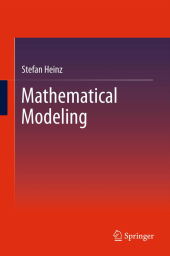 Neuerscheinungen 2014Stand: 2020-02-01 |
Schnellsuche
ISBN/Stichwort/Autor
|
Herderstraße 10
10625 Berlin
Tel.: 030 315 714 16
Fax 030 315 714 14
info@buchspektrum.de |

Stefan Heinz
Mathematical Modeling
2011. 2014. xvi, 460 S. 235 mm
Verlag/Jahr: SPRINGER, BERLIN; SPRINGER BERLIN HEIDELBERG 2014
ISBN: 3-642-44388-5 (3642443885)
Neue ISBN: 978-3-642-44388-6 (9783642443886)
Preis und Lieferzeit: Bitte klicken
This book offers a thorough overview of modeling techniques, basic modeling methods, and modeling solutions. Part I explains basic modeling concepts based on analytical methods. Part II introduces and explains simulation methods for solving research problems.
The whole picture of Mathematical Modeling is systematically and thoroughly explained in this text for undergraduate and graduate students of mathematics, engineering, economics, finance, biology, chemistry, and physics. This textbook gives an overview of the spectrum of modeling techniques, deterministic and stochastic methods, and first-principle and empirical solutions.
Complete range : The text continuously covers the complete range of basic modeling techniques: it provides a consistent transition from simple algebraic analysis methods to simulation methods used for research. Such an overview of the spectrum of modeling techniques is very helpful for the understanding of how a research problem considered can be appropriately addressed.
Complete methods : Real-world processes always involve uncertainty, and the consideration of randomness is often relevant. Many students know deterministic methods, but they do hardly have access to stochastic methods, which are described in advanced textbooks on probability theory. The book develops consistently both deterministic and stochastic methods. In particular, it shows how deterministic methods are generalized by stochastic methods.
Complete solutions : A variety of empirical approximations is often available for the modeling of processes. The question of which assumption is valid under certain conditions is clearly relevant. The book provides a bridge between empirical modeling and first-principle methods: it explains how the principles of modeling can be used to explain the validity of empirical assumptions. The basic features of micro-scale and macro-scale modeling are discussed - which is an important problem of current research.
Deterministic Analysis of Observations.-Stochastic Analysis of Observations.-Deterministic States.-Stochastic States.-Deterministic Changes.-Stochastic Changes.-Deterministic Evolution.-Stochastic Evolution.-Deterministic Multivariate Evolution.-Stochastic Multivariate Evolution."


